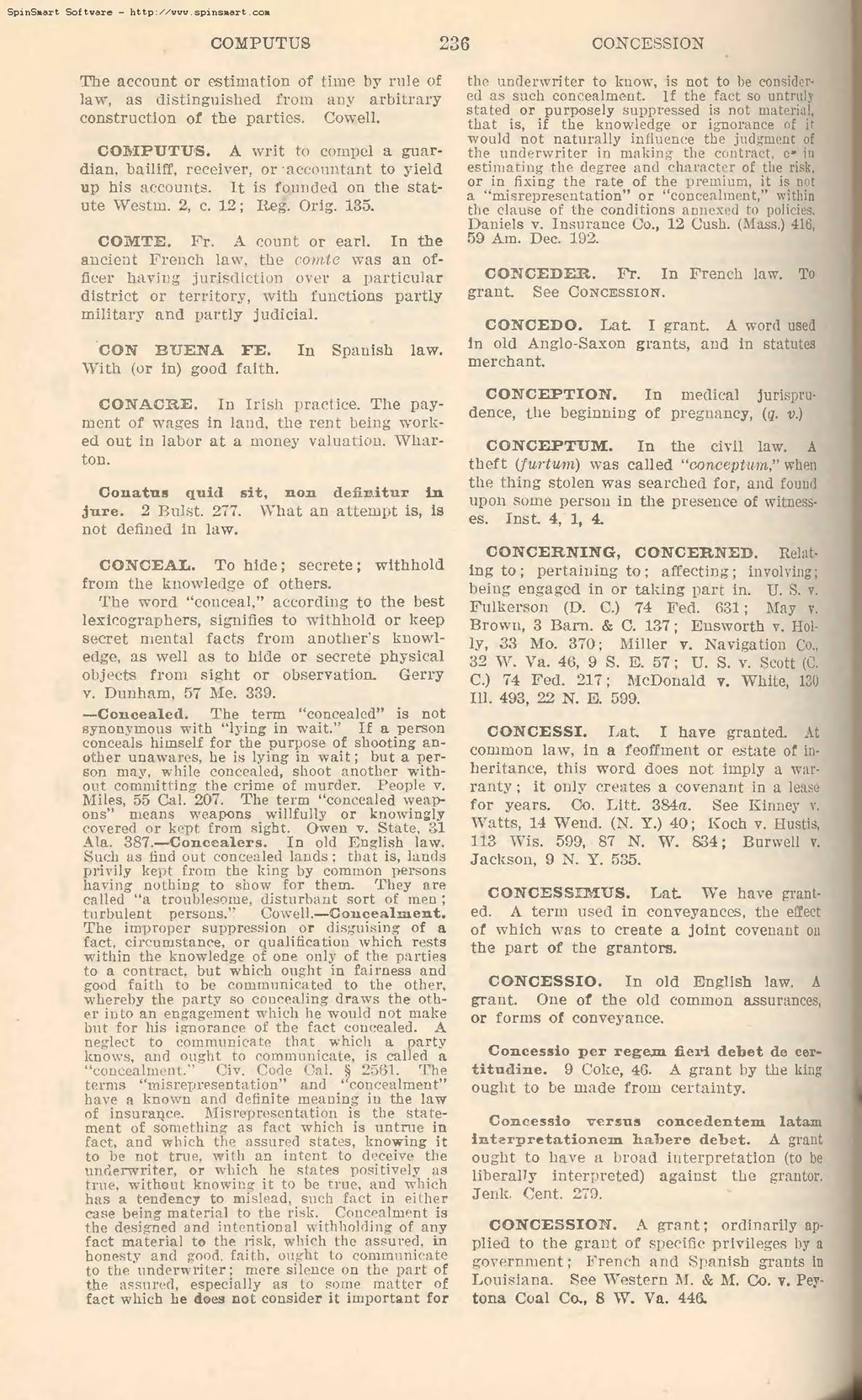The account or estimation of time by rule of law, as distinguished from any arbitrary construction of the parties. Cowell.
COMPUTUS. A writ to compel a guard.ia.n. bailiff. receiver, or accountant to yield up his accounts It is founded on the statute Westm. 2, c. 12; Reg. Orig. 135.
COMTE. Fr. A count or earl. In the ancient French law, the comic was an offlcer having jurisdiction 0\E‘l' a particular district or territory, with functions partly military and partly judicial.
CON BUENA FE. With (or in) good faith.
In Spanish law.
CONACRE. In Irish practice. The pay- ment of wnges in land, the rent being work- ed out in labor at a money valuation. Wharton.
Conntul quid lit. no.1: definitur Ln Jute. 2 Bnlst. 277. What an attempt is, is not defined in law.
CONGEAL. To hide; secrete: withhold from the knowledge of others.
The word "conc-eal." according to the best iexir.-ographers, signifies to withhold or keep secret mental facts from another's knowl- edge, as well as to hide or secrete physical objects from sight or observation Gerry v. Dunham. 57 Me. 339.
—-Concealed. The term "concealed" is not synonymous with "lying in wait." If a person conceals himself for the purpose of shooting an- other nnawares, he is lying in viait; but a person may, while concealed. shoot another without committing the crime of murder. People v. Miles, 55 Cal. 207. The term "concealed weapons" means weapons wiilfully or knowingiy covered or in-pt from sight. Owen v. State. 3] Ala. 3S7.—Concealex-s. In old English law. Such as find out concealed lands: that is, lands privily kept from the king by common persons having nothing to show for them. They am called "a troublesome. disturb-tint sort of men; turbulent persons." Cowell.—Coru:ealnient. The improper suppression or disguising of a fact. circumstance, or qualification which rests within the knowledge of one only of the parties to a contract, but which onght in fairness and good faith to be communicated to the other. whereby the party so concealing draws the othor into an engagement which he wouiii not make but for his ignorsnce of the fact concealed. A neglect to communicate that which a party knows, and ought to communicate. is called a "conccziitnt-nt." Civ. Code C11. 2561 The terms "misrepresenta|:ion" and ‘concealment" have a known and dr-finite meaning in the law of insurance. i\'iisropresent:1tion is the statement of something as fact which is untrue in fact, anii which the assured states, knowing it to be not true, with an intent to dcceive the underwriter, or which he states positively as true, without knowing it to be true, and winch has a tendency to mislead. such fact in either case being material to the risk. Concealment is the designed and intentional withholding of any fact material to the risk, which the assured. in honesty and good faith. ought to communicate to the underwriter; mere silcnce on the part of the assured. especially as to some matter of fact which he does not consider it important for
236
CONCESSION
the underwliter to irnow. is not to be consihr ed as such concealment, if the fact so uni stated or urposely suppressed is not ma that is, ii) the knowledge or ignorance of it would not naturally influence the judgnicnl II the underwriter in making the contract. 0- in estimating the degree anii character of the IN. or in fixing the rate of the premium. it is
a "misrepresentation" or "concealmnnt," wit the clause of the conditions annexed to |JDll('iuI Daniels v. Insurance Co., 13 Cush. (l\iass.) Alli, 59 Am. Dec. 192.
GONG!-IDER. Fr. In French law. To grant See CDNCIEESION.
CONCI-IDO. Lat. I grant. A word used in old Anglo-Saxon grants, and in statutes merchant.
CONCEPTION. In medical jurispru- dence, the beginning of pregnancy, (41. v.)
CONCEPTUM. In the civil law. A theft (furtimi) was called "oonceptum," when the thing stolen was searched for, and found upon some person in the presence of witneb es. Inst. 4, 1, 4.
CONCERNING, CONCERN]-JD. Reinting to; pertaining to: affecting; involving; being engaged in or taking part in. U. S. v. Fuliterson (D. C.) 74 Fed. 631: May v. Brown. 3 Barn. & C. 137; Ensworth v. Holly, 33 Mo. 370: Miller v. Navigation Co. 32 W. Va. 46, 9 S. E. 57: U. S. v. Scott (CL C.) 74 Fed. 217; McDonald v. White. 130 I11. 493, 22 N. E. 599.
CONCESSI. Lat. I have granted. Ai coninion law, in a rcoflment or estate of inherltance, this word does not imply a win- ranty: it only creates a covenant in a lean for years. On. Litt. 384a. See Kinney v. Watts, 14 Wear}. (N. Y.) 40; Koch v. Elustis 113 Wis. 599. 57 N. W. 834; Buriiell V. Jackson. 9 N. Y. 535.
CONCESSIMUS. Lat. We have granted. A term used in conveyances, the ellect of which was to create a joint covenant oi. the part of the grantors.
CONCESSIO. In old English law. A grant. One of the old common assurances. or forms of conveyance.
Concessio per regain fieri debut do certitudine. 9 Cake, 46. A grant by the king ought to be made from certainty.
Concessio versus onncedantam latain lnterpretntionem hnbere debet. A grant ought to have a broad interpretation (to he ilherally interpreted) against the grantor. Jenk. (‘ent. 279.
GONG!-ISSION. A grant: ordinarily applied to the grant of specific privileges by l government; French and Spanish grants in Louisiana. See Western Bi. 6: M. Co. v. Pey- tona Coal Co., B W. Va. 446.
